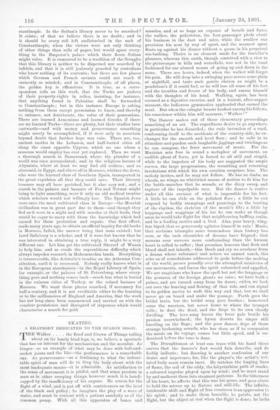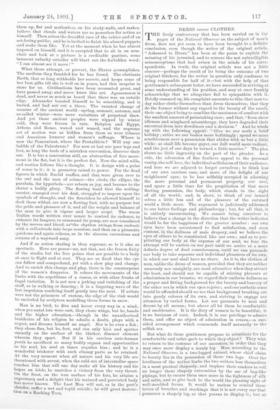SKATING.
A RHAPSODY DEDICATED TO THE SEASON 1890-91. THE Walker . . . . the Roof and Crown of Things toiling about on its lonely hind-legs, is, we believe, a spectacle that has an interest for the mechanician and the moralist. As hinges—as an example of what may be done with ball-and- socket joints and the like—the performance is a remarkable one. As perseverance—as a testimony to what the indomi- table spirit of man will do to drag his body about with the most inadequate means—it is admirable. As satisfaction to the sense of movement it is pitiful, and that sense persists in man as in other creeping things, however much it is handi- capped by the insufficiency of his organs. He craves for the flight of a wind, and is put off with contrivances on the level of the block and pulley ; be imagines the play of a wave of water, and must be content with a patient assiduity as of the common pump. With all this apparatus of bones and
muscles, and at so huge an expense of breath and force, the walker, the pedestrian, the foot-passenger plods about his business in the dust and mire, while the swallow can provision his nest by way of sport, and the meanest sprat floats up against his dinner without a pause in his perpetual sea-bathing. Theirs is an element made for the traveller's pleasure, whereas this earth, though contrived with a view to the picturesque in hills and waterfalls, was not in the least fashioned for our absurd means of going up and down in the same. There are hours, indeed, when the walker will forget his pain. He will drop into a swinging pace across some plain at nightfall, and taste such gentle elation as might be a pendulum's if it could feel, or he will lose all sense of his feet and the troubles and fevers of his body, and amuse himself with the thoughts of his head. Walking, again, has been excused as a digestive exercise, and in a lenient, after-supper moment, the ludicrous gymnastics applauded that earned the meal. But when the eulogist boasts loudest among his fellows, his conscience within him will murmur, " Walker !"
The Dancer makes out of these elementary proceedings something of an art. The superfluous desire to go anywhere in particular he has discarded ; the rude invention of a road, conforming itself to the accidents of the country-side,, he ex- changes for the smooth and level floor ; and he calls in to stimulate and pardon such laughable jiggings and twirlings as he can compass, the freer movement of music. For the Musician sets free in sound a metaphor of movement, an audible ghost of form, yet is forced to sit still and stupid, while to the impulses of his body are suggested the ample curves, the large progressions, the wreathing and returning involutions with which his own creation surprises him. The melody invites, and he may not follow. He has no limbs, no wheels, no wings, no whirlwind means of motion to fit him for the battle-marches that he sounds, or the dizzy sweep and rapture of the impalpable race. But the dancer is restive under all this surmise of what is impossible for his feet. A little he can slide on the polished floor ; a little he can respond by bodily stampings and prancings to the beating of the rhythm, the skeleton of the music's life ; a little by hoppings and waggings of his toe he can make as though anon he would take flight for that neighbouring baffling realm, and be a leading motive and a bird. Alas, poor heavy, wing- less biped, that so generously agitates himself in vain ! Music, that acclaims triumphs more tremendous than history has seen, or the 'rash chronicles of dreams have feigned ; that mourns over sorrows more confounding than the human heart is called to suffer ; that promises heavens that flesh and blood shall not inherit,—this throb and cry we overhear from a drama whose substance and actors we cannot touch, this echo as of consolations addressed to gods before the making of the world, passes proudly over the attempted mimicries of our movements, and leaves the spirit exhausted and appalled, We are magicians who know the spell but not the language or the gestures of the foreign ghosts we raise; we have built a palace, and are turned away from its doors; exiles, we look out over the heaving and flowing of that tide, and can signal to its golden navies to waft this way and that, but we shall never go on board and make the passage. Forth goes the bridal train, but the bridal song goes further ; homeward come the warriors, but never home to where the trumpet calls ; to dust the dead, and the dirge to its own cloudy dwelling. The love song leaves the lover pale beside his passion overwhelmed ; the hymn deserts its singer still kneeling on the flags ; and the poor dancer, dupe of those strange beckoning sounds, who has risen as if to companion the music on its voyage, comes but little speed, and is un- deceived before the tune is done.
The Draughtsman at least can trace with his band those curves that the dancer's feet would fain describe, and do feebly indicate; but drawing is another confession of our desire and impotence, for, like the player's, the artist's irri- tated body must remain inert. He watches the leaping lines of flame, the coil of the eddy, the labyrinthine path of smoke, a coloured impulse played upon by wind ; and he must stand by and maltreat them into stagnant patterns. In the bitterness of his heart, he affects that this was his game, and goes about to hold the mirror up to Nature and still-life. The infinite, intolerable shift and. flight of free creatures is an oppression to his spirit ; and to make them bearable, he paints, not the flight, but the object at rest when the flight is done ; he locks
them up, flat and motionless, on his study-walls, and makes- believe that clouds and waters are as powerless for action as 'himself. Then arises the dreadful race of the critics and of an art-loving public; and he is incited to finish his absurd puppets and make them like. Yet at the moment when he has almost :imposed on himself, and it is accepted that to sit in an arm- chair and look at a picture is a creditable pastime, some innocent unlucky outsider will blurt out the forbidden word; "I can almost see it move !"
What these attempt, or pervert, the Skater accomplishes. The medium they fumbled for he has found. The obstinate Earth, that so long withholds her secrets, and keeps some of her best gifts till she is well on in years, had this surprise in store for us. Civilisations have been accounted great, and have passed away, and never knew this art. Agamemnon is -dead, and never so much as heard that there was an outside -edge. Alexander boasted himself to be something, and is buried, and had not cut a three. The vaunted change of -seasons of the ancient world—spring, summer, autumn, and so-called winter—were mere variations of perpetual thaw. And yet those ancient peoples were nipped by winter -cold, they were frozen in vain. Babylon and Egypt, Athens and Rome, waxed and waned, and the supreme art of motion was as hidden from them as were tobacco and American humour and women's suffrage. Where is now the Pancratiast, where the Penta-thlete I' Will any one babble of the Paltestrum P For now at last our poor legs and feet, so long the tools of a mistaken convention, discover their -use. It is but a convention still, an abstraction of free move- ment in the flat, but it is the perfect flat. Now the mind wills, and motion follows like a thought. It is design with a pulse -of sense in it ; it is geometry raised to power. For the dead figures in which Euclid traffics, and that were given over to the owl and the man of science—the circle, the ellipse, the parabola, the hyperbola—are reborn as joy, and become to the skater a bodily glory. The flowing hand that the writing- master, cramped over his desk, struggled to impose upon the -symbols of thought, and the flourishes he allowed himself to -deck them withal, are now a flowing foot, with no purpose but the pride and pleasure of it, and all the weight and balance of the man to give it vigour and larger scop6. The warm Italian words written over music to control its cadence, to .enhance its languor, to command its pomp, are now translated by the nerves and blood, aethe rhythm swings from andante with a rallentando into largo maestoso, and then on a pirouette quickens and again relaxes, as in the sinuous excursions and returns of a wayward song.
And if as action skating is thus supreme, so is it also as spectacle. Here are poses—no, not that, not the frozen fixity • of the studio, but the free poises that are possible to a body at once in flight and at rest. They are so fixed that the eye can follow and comprehend, yet with a slow play and change. And to enrich this change and play, there is the counterpoint of the women's draperies. It echoes the movements of the limbs with the repetitions of a canon, or with other freaks of fugal variation. It is not now a jerking and twitching of the -stuff, as in walking or dancing ; it is a lingering wave of the last impulsion resolving itself gently into the next. If artists were not the prisoners of custom, the edge of the rink would be encircled by sculptors modelling those forms in snow.
Man is no bird, to dive and hover every way in a wind; when pre-natal lots were cast, they chose wings, but he, hands and the higher education,—though in the unauthorised broideries of his religion he admits a doubt, plays with a regret, and dreams himself an angel. Nor is he even a fish ; they chose fins, but he, feet, and can only kick and sputter uneasily on the surface of the thicker, dimmer element -wherein they sport. But if in his careless ante-human youth he sacrificed so many bodily organs and opportunities to his soul, his soul at times requites him ; and he is a wonderful trickster with such clumsy parts as be retained. At the very moment when all nature and his very life are threatened with arrest, when the cold out of interstellar space touches him that will one day make all his history and his lopes an icicle, he snatches a victory from the very threat. On the frost, on the iron surface of his fate, he attains a supremacy and a delight that his maimed and perverted body 'has never known. The Last Man will not, as in the poet's slander, suffer a wet and tepid suicide; he will greet destruc- tion on a Rocking Turn.







































 Previous page
Previous page